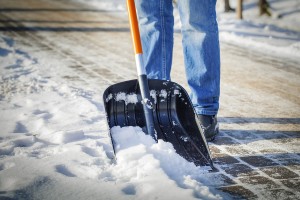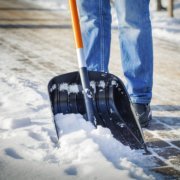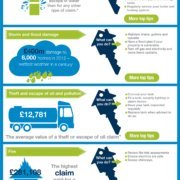The first signs of snow are often met with as much excitement as they are trepidation, but for holiday homeowners the falling of the white stuff brings with it a range of different issues and none more important than ensuring the safety of your guests.
To view our `Preparing your holiday home for snow’ infographic full size, click here.
You can view the full size interactive version of our `Preparing your holiday home for snow’ infographic by clicking here.
Top tips for preparing your holiday home for snow
Here’s our top tips for preparing your holiday home for snow and dealing with it effectively once it’s arrived.
Be prepared and take action
The majority of snow that falls in the UK will be accompanied with much fanfare on all weather forecasts. If snow is due in your area don’t wait until it’s too late; consider placing rock salt on the paths and walkways to your holiday home so there is clear access for visitors. This should include the entrance to any garages or where your guests will park their cars. Rock salt is available for a few pounds per 25kg bag from the large DIY stores and builders merchants.

You should also ensure drains and guttering are clear from blockages and able to cope with the increased levels of water when the snow melts.
Use rock salt rather than hot water
Whilst pouring warm or boiling hot water on snow will provide an immediate solution to any potential buildup, this water can quickly refreeze and cause treacherous icy conditions.
Rock salt is a far more suitable solution to dissipate or prevent the build up of snow. If rock salt isn’t available then sand or ash can also be used as an alternative, although they are not as effective at preventing refreezing in cold winter conditions.
Don’t block drains when moving snow
If you need to move snow away from pathways think carefully about where you place the snow being moved.
Blocked drains can often be the cause of significant damage to property. With the increased levels of water running through drainage systems once melting begins it is vital that these are free to take the upturn in water volume.
Ensure your own safety
If you are moving snow or taking measures to ensure your property is accessible make sure it is safe for you to do so.
It’s advisable to create a central path for yourself, from where you can work outwards on cleared land and thus avoiding shoveling snow from an unstable or slippery base.
Also beware that black ice could have formed underneath the snow. Consider placing salt on the pathway and returning to move any other snow later in the day, during daylight hours when temperatures are likely to be slightly higher and visibility greater.
Have you got guests in your holiday home?
If snow is forecast or has already fallen think carefully about how you communicate this with your guests. The more information you provide visitors with the better they will be able to handle the weather conditions.
For example, should they only be using the front entrance to your holiday home?
Are there any routes that they should be avoiding?
Are they fully aware of what to do if the pathways to your cottage become blocked or the facilities or items within your holiday home that would enable them to safely combat such situations?
Be as proactive as you can be in communicating the risks of snow to your guests, along with how they can be safely mitigated.
The after effects
It’s important to highlight that potential issues don’t disappear with the thawing of the snow. The heaviest snowfall often occurs between two and zero degrees centigrade. These conditions, when combined with increased water levels from melting and other winter weather can mean potentially longer lasting damage to your property and its surrounds.
Ensure that you check drains and guttering for any blockages or damage, and also that pathways are still in a safe condition once the snow has passed. You may also find the following posts on preventing slips and trips and burst pipes of interest:
- Limiting the risks of slips and trips in your holiday home
- Tips to avoid burst pipes for UK holiday home owners
Boshers offer specialist holiday home insurance to owners across the UK. For more information on how a specialist insurer can help and support your holiday home business, please give us a call on 01237 429444.



